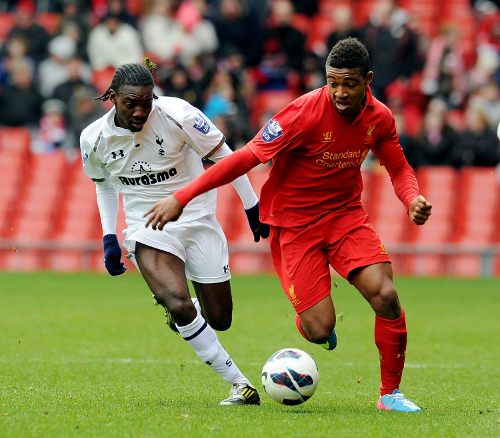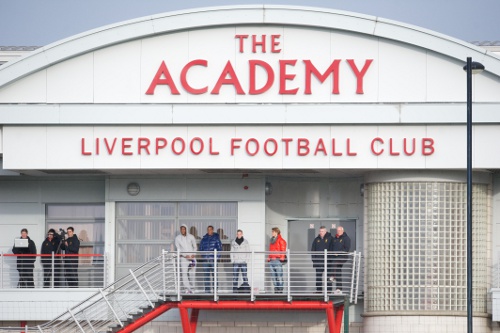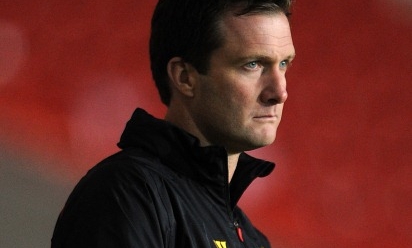'LFC invest more in their Academy teams'
Football writer Harry Hugo - from thebibtheorists.com - interviewed U21s boss Alex Inglethorpe to find out, amongst other things, why Brendan Rodgers was the only manager he would have left Spurs for...
I have always known of his name. I have always known his career path. This might sound odd, but Alex Inglethorpe's name is almost engrained in my family's folklore.
A young Inglethorpe worked at the sinks of my Dad's Harvester chain for the summer months in the late 80s: washing dishes, scraping saucepans and mopping floors. My Dad still insists he is one of the most natural golfers he has ever played with and one of the most hard-working members of staff he has ever employed.
But that's not where the family link ends.
The now Liverpool U21 manager also endured time playing football with my uncle at youth level, under the instruction of the manager, my grandad. The Hollies were a successful team under the influence of the three, as well as my mum, aged 10, who was Chief of Half-Time Orange Distribution, and my Grandma, Director of Laundry.
This link has carried my family well since Alex's emergence in professional football. When he managed Exeter City to an FA Cup replay with Manchester United in 2005 he invited my grandad's then side, Witchampton, to train with the Exeter first team.
Every branch of my family tree knew or knows him; however, even with these strong connections, I had never met the renowned Alex Inglethorpe. I had never even spoken to him until January 15, 2013.
My interest grew when he became the Tottenham youth team manager in 2006. He was constructing a reputation as a top coach at a relatively young age. This interest then sparked into frenzy when he was linked with a move to Liverpool Football Club in late 2012.
I became his expert to all those on Twitter. I was the go-to man for information on Inglethorpe. I had still never met him.
When he was confirmed as a member of Brendan's new backroom staff in November 2012, I was excited.
I made it my mission to seek out Alex and secure an interview. I sent an email (in hope rather than expectation) and he got back to me. After a few weeks of correspondence we decided it would be best to conduct a phone interview, something that would suit both of our schedules. He chose a Tuesday at 11am.
"Iconic figures are usually players that have come through the youth academy. Look at Gerrard/Carragher at Liverpool, Terry at Chelsea and Ryan Giggs at United. I'm here to find the next icon"
Alex Inglethorpe
Now, I have college on Tuesday at 11am. So instead of sitting in a half-empty IT room, I sat in my car on the road outside the school - waiting for the clock to strike eleven. (All you teacher folk, don't worry - I had permission.)
With notes spread like a banquet across the dashboard and laptop raised aloft on the driver's seat, I was ready.
The conversation began with wishes to the family and such niceties as the rain thundered onto my windscreen but I was so pleased that the metaphoric ice had been broken.
I particularly wanted to focus on the development of youth and the policy that goes with it and not specific players within the Academy. However, I started with a sweeping question.
Which players would you like to see make the step up to the first team in the next 12 months?
He answered as I expected he would:
"All of them. They have all worked very hard and have sacrificed a lot be in the position that they are in. They have trained every day, neglected social lives and hassled parents. They all deserve it."
Alex had been excelling at the helm of Tottenham's academy, thus I was inquisitive as to why he wanted to leave. He had said to me in an email that Liverpool (Brendan Rodgers, in particular) would have been the only place he would have left Spurs Lodge for. I found this interesting so I decided to question how he was finding his new working environment.
How has life been at Liverpool since your move from London?
"The city is fantastic and I have been fortunate enough to get to stay right in the city centre itself. The people are unbelievable, just so friendly and approachable. The south of England always felt like home, but Liverpool has welcomed me with open arms!
"However, I have made sacrifices. I left my family at the other end of the country! But they did join me in April, so I'm looking forward to seeing the wife and kids more frequently. It'll really feel like home once that's sorted."

I know you are the U21s manager, but how often do you interact with other squads and especially the first team?
"My job is in the reserves but I am interested in all levels.
"I watch or interact with the first-team squad or Brendan at least once a week, and I'm actually heading off to an U16 game after this!
"My previous clubs didn't invest that much money in the academy teams; this is different at Liverpool."
I have noticed a switch to a 4-3-3 formation in recent weeks, is that something that's being installed at all levels now?
"I have to be honest, my preference is a 4-3-3. If you play in the Champions League, 4-3-3 is a must. At lower levels, defenders have to learn their trade in the best way possible to come against the world's best centre-forwards.
"It's an attacking formation so I like it. But it also helps the development of the defenders, as they have to mark large spaces around the circumference of their position. This is aided with a pivoting midfield helping the two centre-backs as the full-backs fly on so at times it should be a '3-0-7' formation and that's what really helps the defenders progress positionally.
"However, development takes time and this is especially true with defenders. Therefore, sometimes you have to sacrifice results at this level for style and the overall development of the youngsters. At the end of the day, youth results are absolutely pointless - it's the development that's important!"
How important is the pivot role in the 4-3-3 and is it something the classic numbers 10s in your squad have had to learn?
"It's not necessarily a deeper role - really it's two number 10s. Joao [Texeira] is obviously used to the 4-3-3 as he was taught it at Sporting Lisbon, where they specialise in fluid formations. He knows that midfield more than some of the other lads but again, it's all a learning curve."
What are the benefits and circumstances in which you may feel sending a player out on loan to another club benefits them more than staying at the academy and vice versa?
"There is absolutely no blueprint to developing a player. My job is not to find the overall blueprint, but to find the right way to do things for each individual. It really depends what's in the best interests for the player.
"For instance, Raheem [Sterling] didn't need a loan as he had the best possible experience in the first team at such a young age. A loan wouldn't have helped him as he developed quickly. This was obviously helped, however, by the shortage in attack that Brendan had at the start of the season.
"But the best example to counter that is that of Steven Caulker. I managed him at Tottenham and sent him out on loan to Yeovil Town and then again to Bristol City. After those 80 or so games, he had learned his trade in a professional environment and therefore earned himself a loan deal to Brendan's Premier League Swansea."

Was this your first communication with Brendan Rodgers?
"No no, I have known Brendan for some time now. It was great of him to trust me on Steven's career judgment, as obviously it was my job to develop the youth at Tottenham.
"I think Steven will look back and realise his growth when he went out on these loans but again, some players, like Raheem, don't need this time."
I wanted to know more about the NextGen Series and how it had helped him as a youth coach as it has escalated to become the biggest competition in youth football.
Is the NextGen Series a nuisance or an aid?
"It's an enormous help; like you wouldn't believe!
"The Premier League is made up of 70 per cent foreign players. Therefore, to be representative you need to play abroad.
"If you play academy football in England you are only ever really going to be playing against players who will play in the Football League, not the Champions League. Liverpool aspires to the Champions League so we have to play, and educate, the players in the European style of football.
"I'd go as far as saying we need to replicate the first team, like for like. From things as simple as jet lag to things a bit more taboo as 'gamesmanship', young players need to understand and live with it.
"Travel broadens the mind - I'm a firm believer of that. Whilst it also broadens the mind, it broadens the appreciation for football. The challenge of coaching isn't to teach the system, but the style.
"If you want to be the best then you have to beat the best in Europe, not just England."
How hard is it keeping young players focused and nurtured with pressure piled on them?
"Very, very difficult. In fact it's hard to develop talent because of it. Players are earning a lot of money at such a young age, I'd probably say too much.
"But as much as that cliché is said: the best players don't play for the house, the car or even the woman; but for the legacy. Look at Steven Gerrard, Luis Suarez. They want to win silverware - not a plush mansion in a nice area. To them, that's a byproduct of victory."
Is the next Steven Gerrard in the Academy at the moment?
"I can't say that. Steven is a special player. What I can say, however, is that the lifeblood of any club is that of local lads.
"Iconic figures are usually players that have come through the youth academy. Look at Gerrard/Carragher at Liverpool, Terry at Chelsea and Ryan Giggs at United.
"I'm here to find the next icon."
I didn't want to keep Alex much longer so decided to wrap it up with a more generic question.
What is the best thing about being at Liverpool Football Club?
"That's a good question... I'd say the people. Everyone from the players, the staff - even the chef! Everyone is just fantastic. They live for the club and that's a joy to be part of."
We said our goodbyes and left it. I had finally talked with Alex; the man my family knew all too well.
It was fortunate he had joined Liverpool. He knew it inside out. Every question was rebounded with an answer that reflected a stern vision. He and Brendan are on the same wavelength - they are alike in a lot of ways. Both carved coaching careers through youth football and came to a top club at a youngish age.
However, it in no part meant he had to conduct himself in such a professional and approachable manner to someone that was a mere relative of some people he knew 15-20 years ago. For that, I thank Alex and I hope we meet up at some stage.
The rain continued to thunder down, notes strewn across the car and laptop back in its case. I hopped back off to the IT lesson I was meant to be in.
This interview was originally published on www.thebibtheorists.com.



